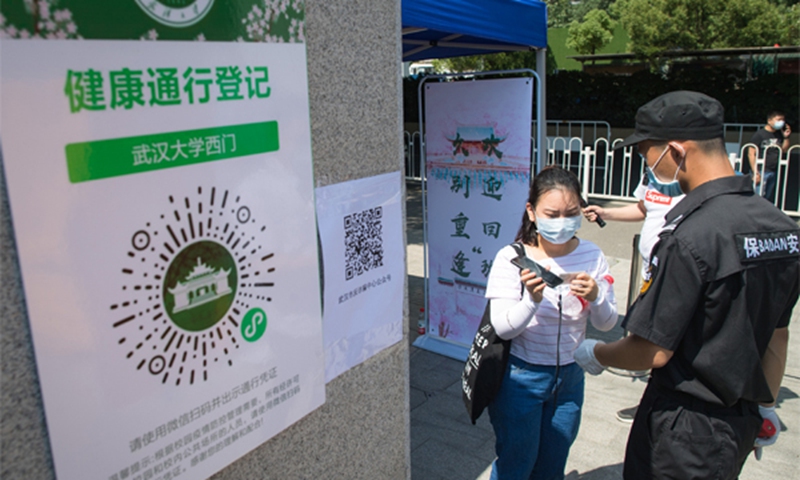Global COVID-19 QR code key to restart
By Li Qiaoyi and Zhang Dan Source: Global Times Published: 2020/11/24 20:53:40
China-proposed app needs focus on data protection

A student scans a QR code to register her health information at the west gate of Wuhan University in Wuhan, Central China's Hubei province, on June 8, 2020. Photo: Xinhua
One of China's distinct solutions to combat COVID-19 pandemic is setting up an international mechanism consisting of a QR health code as proposed by China's top leader over the weekend.
Observers said the QR code might get a trial first in China's neighbors that will have "green lanes" for travel with China, and the lynchpin of the proposal is to iron out political mistrust and dissipate concerns over user privacy and data security.
Chinese President Xi Jinping on Saturday called for the establishment of an international mechanism involving health code mutual recognition, and he welcomed participation by more countries, the Xinhua News Agency reported.
The mechanism should be based on nucleic acid test results and use universally recognized QR codes, the top Chinese leader said at the 15th G20 Leaders' Summit via video link.
"At present, the establishment of an international mechanism of health code mutual recognition is in the early stage, and the next step will focus on the mutual recognition of the mechanism among different countries, information protection and data applications," Chinese Foreign Ministry spokesperson Zhao Lijian said on Tuesday, adding the country will communicate with relevant parties on the issue.
In China, health code services are enabled via two ubiquitous platforms - Ant Group's Alipay and Tencent's WeChat - with mini-programs within the platforms requesting subscribers to fill in personal information such as ID numbers, mobile phone numbers and home addresses for a colored QR code to be generated.
Like traffic lights, the green code is an indication of safety while a yellow or red code would mean mandatory quarantine, because the individual may have been around someone who has been confirmed as a COVID-19 case.
People in China need to show a green code before entering supermarkets, hotels, parks and restaurants.
The nationwide digital health code system is composed of different health codes across provinces and cities, meaning that users need to access local health codes to verify their health condition.
Tencent said it still has no plan for health code mutual recognition when contacted by the Global Times on Tuesday. Ant Group couldn't be immediately reached for comment.
A study by Oxford University released in April found that if 56 percent of a country's population used a tracking app, the coronavirus epidemic could be suppressed completely.
Countries including Australia, Japan and Singapore have all used tracking apps to trace peoples' movements and potential exposure to COVID-19, but there is no mutual recognition mechanism for the apps.
There are no technical barriers to the creation of a mutually recognized health code mechanism, experts said.
A mutual recognition mechanism is plausible in technical terms. It would require the interfaces of personal health code systems - so long as they are up and running in other countries and regions - to be connected to that of the system prevailing in China, Cheng Maiyue, director of the Wuzhen Institute, an internet industry think tank, told the Global Times on Tuesday.
Concerns about personal health data privacy could be a major challenge, Cheng said, noting the mutual recognition proposal is intended to share China's experience and facilitate anti-virus efforts outside of the country.
Arguing against any intention to politicize the proposed mechanism, the internet veteran stressed it's in the interest of both China and the world to ensure human life is given the utmost care while minimizing the virus' fallout on the economy.
In the era of big data, a globally recognized health code mechanism underpinned by technology is intended to facilitate flows of people, goods and services. It's therefore essentially a constructive solution to the coronavirus-hit global economy, according to Cheng.
He stressed that China, the first to emerge from the pandemic, could do more things than the US, which is still grappling with the deadly disease, for trust to be built. The mechanism could potentially get initial trials in countries that have "green lanes" or fast lanes for travel with China during the pandemic, said experts.
China's neighbors may be the first to adopt such a mechanism to reduce the difficulty and complexity of cross-border movement of people and goods, and promote the region's economic recovery and trade growth, according to Song Guoyou, deputy director of the Center for American Studies at Fudan University.
"The proposed mechanism is the only conduit to restart the international aviation market, which is expected to come before the availability of coronavirus vaccines," Qi Qi, an aviation market watcher, told the Global Times on Tuesday.
It might be not easy for the likes of the US and UK that are ideologically less friendly to join the initiative immediately, while some parts of the world such as the Arabian nations, areas in Europe where the pandemic is better contained, and South Africa could be the early adopters to work with China to institute the mechanism as virus containment becomes the norm, Qi said.
As for privacy issues, the health code mechanism is not intended to record people's personal information but to track their health status, the market watcher said, adding that when needed, blockchain technology could be used to trace personal records for epidemic prevention and control.
That's not to say China would enforce its health code system on other economies, experts said, urging the international community to start talks for feasible ways to reboot the global economy without putting human lives at stake.